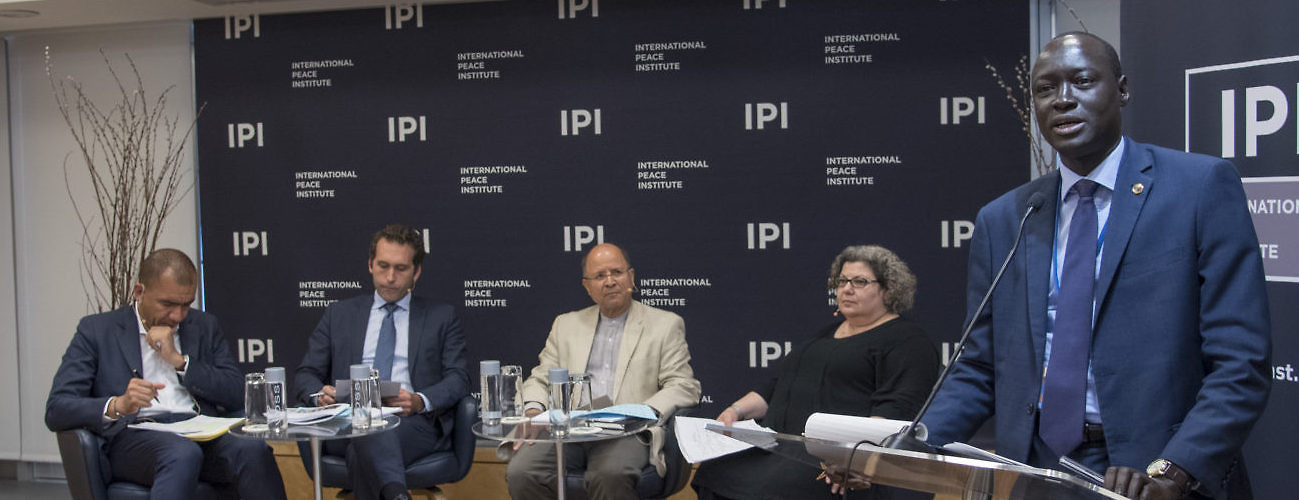The Bamako Agreement, aimed at bringing peace and reconciliation to Mali, had its two-year anniversary on June 20, 2017. IPI took the occasion to assess its implementation to date, and how it informs the way forward, with a panel discussion and release of the report, “A Process in Search of Peace: Lessons from the Inter-Malian Agreement.”
This is the third time that a Malian crisis has led to a negotiated agreement between the government in Bamako and armed groups in the North, and the legacy of past failure to reach peace has fed mistrust on both sides and radicalized the armed movements.
Marie-Joelle Zahar, Senior Visiting Fellow at IPI, Professor at Université de Montréal, and co-author of the report, said it was not a “scorecard,” but rather an aid to “thinking about mediation practices and how our mediation team can learn from this so that implementation of peace agreements is easier and more sustainable.”
Ms. Zahar lamented that, “No parties felt they ‘owned’ the agreement, rather that agreement was imposed upon them.”
Speaking of the UN’s role in the process, Ms. Zahar warned that, “The UN is increasingly likely to find itself in a situation, without lead in mediation and unable to shape the agreement the way it ought to.”
She went on to highlight the importance of the UN as a leader in mediation, saying, “The UN is a norm-entrepreneur. It’s the role of the UN to stand for a certain set of principles.”
“For example,” she continued, “if the UN didn’t talk about inclusivity, nobody would. It may sound like nagging but we found that with all Malians we talked to, the UN’s hammering of inclusivity made it an issue people talk about of their own volition.”
Arthur Boutellis, Director of IPI’s Brian Urquhart Center for Peace Operations and co-author of the report, elucidated the six key issues that created challenges during implementation as follows:
- The government’s role in implementation: While the government has recently shown greater will to move ahead, implementation has lagged, and the method of implementation has created tensions with armed groups and contributed to the dysfunction of follow-up mechanisms.
- The fragmentation and recomposition of armed groups: Continuous realignments among armed groups have created challenges for the mediation team, allowed the government to blame the stalled implementation on insecurity, and caused these groups to focus more on community-based and individual perks than on peace dividends.
- The “clanization” of the peace process: Power struggles between and within clans have fed into the cycle of insecurity and contributed to stalling implementation.
- “Unspoken factors” including terrorism and trafficking: While the negotiations did not address terrorism and organized crime, these have become pressing challenges during implementation.
- The lack of peace dividends and societal buy-in: Slow implementation in the area of development has weakened buy-in to the process among northerners, while perceived concessions to armed groups and northerners have weakened buy-in in the south.
- Maintaining unity of action and purpose in the international community: The diversity of actors on the international mediation team has sometimes helped hammer out agreements but has also made it difficult to maintain unity of vision and a constant level of engagement.
Mr. Boutellis also spoke of the problems caused by fragmented armed groups, saying that their vying for space in the follow-up to the agreement delayed its implementation. “One of the biggest consequences of this is that the government distanced itself,” said Mr. Boutellis. “Another consequence is that armed groups focused more on community and individual perks than peace dividends.”
Samuel Gahigi, the West Africa Team Leader for the UN Department of Peacekeeping Operations, said that IPI’s report would act as “a guiding Bible for the next steps on Mali peace process.”
Mr. Gahigi went on to say that the implementation of the Malian agreement should not deviate from its provisions. “Either you address the agreement and the structure of the implementation, or you stick to it,” he argued.
Issa Konfourou, Permanent Representative of Mali to the UN, provided the Malian government perspective, expressing “concern” regarding “the tension between the two signatory groups—Platform and Coordination.” He further called on the international community to support the Malian government in implementing the Bamako Agreement.
“What I want people to know,” he said, “is that if the state authority is weakened, we give power to the streets and when power goes to the streets, the regions and the community will take over, which is a danger for the state.”
Thomas Schieb, Minister Plenipotentiary of Germany to the United Nations, highlighted the importance of mediation in resolving situations such as the one in Mali. “German foreign policy recognizes mediation as a key pillar of successful and sustainable conflict resolution,” he said, adding that, “fast and effective implementation of peace agreements is the only way to prevent a return to violence.”
Youssef Mahmoud, a Senior Adviser at IPI who moderated the discussion, concluded by pointing out that the very nature of peace processes can present obstacles to achieving peace, warning, “If you’re still confusing peace agreements with peace, think again.”
“Process is very gainful, particularly for those who sit on the implementation mechanism,” he said. “There is a lot of per diem, there is a lot of money involved… Sometimes you find yourself subsidizing processes rather than rushing to the outcome of peace.”
This event was co-sponsored by the Permanent Mission of Germany to the UN.








